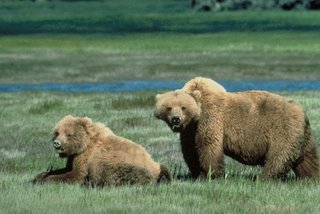Yellowstone Griz
In news that is of great importance to me, it looks like the way has been cleared to de-list the Grizzly Bear as an endangered species in the the land in and around Yellowstone National Park.
This news affects me because like a lot of people I feel a very close connection to Yellowstone. I worked there as a National Park Service volunteer in 1996, during what was probably the best summer of my life. Have you ever gone somewhere or done something that completely changes the way you look at the world? In Yellowstone, as in other wild places, the natural world moves according to it's own rhythm, not according to the artificial order that we have tried to impose on it. Spend enough time in a living, unspoiled ecosystem like Yellowstone and you will begin to feel it. You feel it in things you never noticed before but that now, free from electronic distractions, you wonder how you ever missed them. Things like the migration patterns of birds, or how spectacular alpenglow can look, or how small you feel when you walk across a mile-wide meadow with no other human being or man-made structure in sight, and with the full knowledge that out here you are not the top of the food chain. Though rarely seen, the presence of North America's largest predator seemed to be everywhere in Yellowstone. It was as if he watched over his domain like a distant, all-powerful monarch. But at the same time, no matter how intimidating the presense of the bear was in this wild place, there was also the knowledge that the bear had retreated into this high, cold corner of the continent because he could no longer survive in most of his former domain. What a strange contradiction: tremendous animal potency with a razor-thin survival margin.
you ever gone somewhere or done something that completely changes the way you look at the world? In Yellowstone, as in other wild places, the natural world moves according to it's own rhythm, not according to the artificial order that we have tried to impose on it. Spend enough time in a living, unspoiled ecosystem like Yellowstone and you will begin to feel it. You feel it in things you never noticed before but that now, free from electronic distractions, you wonder how you ever missed them. Things like the migration patterns of birds, or how spectacular alpenglow can look, or how small you feel when you walk across a mile-wide meadow with no other human being or man-made structure in sight, and with the full knowledge that out here you are not the top of the food chain. Though rarely seen, the presence of North America's largest predator seemed to be everywhere in Yellowstone. It was as if he watched over his domain like a distant, all-powerful monarch. But at the same time, no matter how intimidating the presense of the bear was in this wild place, there was also the knowledge that the bear had retreated into this high, cold corner of the continent because he could no longer survive in most of his former domain. What a strange contradiction: tremendous animal potency with a razor-thin survival margin.
The fact that the bears are going to be de-listed means that management of the Yellowstone Grizzly Bear population (which today totals about 600 animals in parts of three states) will be taken out of the hands of the Federal Government and given over to state officials. I have mixed feelings about this; on one hand, the Grizzly population has definitely recovered significantly in recent years. When they were originally listed in 1975 the population was estimated to be 136 animals, and Federal protection has brought the bear population up to a much healthier level. De-listing may not be an unreasonable measure in the Yellowstone area. On the other hand, this is a measure being taken by a Federal Government that is now controlled by people who don't value the preservation of wild places, who see the natural world as something that exists only to be exploited and used up as quickly and profitably as possible. Call me paranoid, but if the gang that currently runs Washington D.C. wants to do this, then I doubt that they have either the bear's best interests in mind, or the interests of Yellowstone itself. These are people who would toss out the Endangered Species Act without a second thought if they could. Heck, they'd eliminate the National Park System entirely if the American people would stand for it.
I strongly suspect that in the minds of powerful men in Washington, de-listing the Yellowstone Griz is one more step in their long, patient slog toward eliminating any and all Federal protections over the few remaining wild areas of the West. The People would never stand for an oil platform in the middle of Yellowstone Lake, at least not today. But over time, with a steady drip, drip, drip of small losses of protection here and there, the dreams of the industrialists may yet be realized. It's a scary thought.
This news affects me because like a lot of people I feel a very close connection to Yellowstone. I worked there as a National Park Service volunteer in 1996, during what was probably the best summer of my life. Have
 you ever gone somewhere or done something that completely changes the way you look at the world? In Yellowstone, as in other wild places, the natural world moves according to it's own rhythm, not according to the artificial order that we have tried to impose on it. Spend enough time in a living, unspoiled ecosystem like Yellowstone and you will begin to feel it. You feel it in things you never noticed before but that now, free from electronic distractions, you wonder how you ever missed them. Things like the migration patterns of birds, or how spectacular alpenglow can look, or how small you feel when you walk across a mile-wide meadow with no other human being or man-made structure in sight, and with the full knowledge that out here you are not the top of the food chain. Though rarely seen, the presence of North America's largest predator seemed to be everywhere in Yellowstone. It was as if he watched over his domain like a distant, all-powerful monarch. But at the same time, no matter how intimidating the presense of the bear was in this wild place, there was also the knowledge that the bear had retreated into this high, cold corner of the continent because he could no longer survive in most of his former domain. What a strange contradiction: tremendous animal potency with a razor-thin survival margin.
you ever gone somewhere or done something that completely changes the way you look at the world? In Yellowstone, as in other wild places, the natural world moves according to it's own rhythm, not according to the artificial order that we have tried to impose on it. Spend enough time in a living, unspoiled ecosystem like Yellowstone and you will begin to feel it. You feel it in things you never noticed before but that now, free from electronic distractions, you wonder how you ever missed them. Things like the migration patterns of birds, or how spectacular alpenglow can look, or how small you feel when you walk across a mile-wide meadow with no other human being or man-made structure in sight, and with the full knowledge that out here you are not the top of the food chain. Though rarely seen, the presence of North America's largest predator seemed to be everywhere in Yellowstone. It was as if he watched over his domain like a distant, all-powerful monarch. But at the same time, no matter how intimidating the presense of the bear was in this wild place, there was also the knowledge that the bear had retreated into this high, cold corner of the continent because he could no longer survive in most of his former domain. What a strange contradiction: tremendous animal potency with a razor-thin survival margin.The fact that the bears are going to be de-listed means that management of the Yellowstone Grizzly Bear population (which today totals about 600 animals in parts of three states) will be taken out of the hands of the Federal Government and given over to state officials. I have mixed feelings about this; on one hand, the Grizzly population has definitely recovered significantly in recent years. When they were originally listed in 1975 the population was estimated to be 136 animals, and Federal protection has brought the bear population up to a much healthier level. De-listing may not be an unreasonable measure in the Yellowstone area. On the other hand, this is a measure being taken by a Federal Government that is now controlled by people who don't value the preservation of wild places, who see the natural world as something that exists only to be exploited and used up as quickly and profitably as possible. Call me paranoid, but if the gang that currently runs Washington D.C. wants to do this, then I doubt that they have either the bear's best interests in mind, or the interests of Yellowstone itself. These are people who would toss out the Endangered Species Act without a second thought if they could. Heck, they'd eliminate the National Park System entirely if the American people would stand for it.
I strongly suspect that in the minds of powerful men in Washington, de-listing the Yellowstone Griz is one more step in their long, patient slog toward eliminating any and all Federal protections over the few remaining wild areas of the West. The People would never stand for an oil platform in the middle of Yellowstone Lake, at least not today. But over time, with a steady drip, drip, drip of small losses of protection here and there, the dreams of the industrialists may yet be realized. It's a scary thought.






0 Comments:
Post a Comment
<< Home